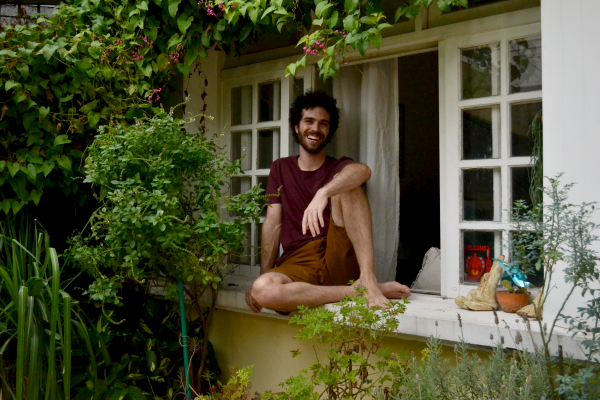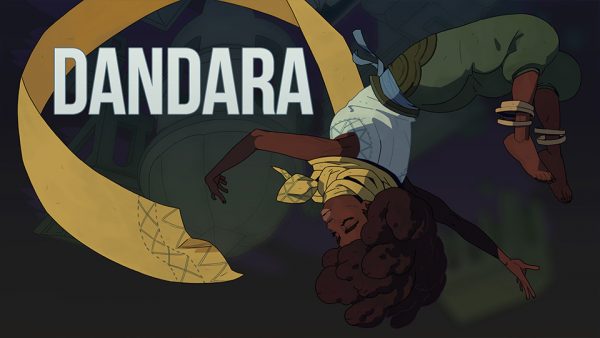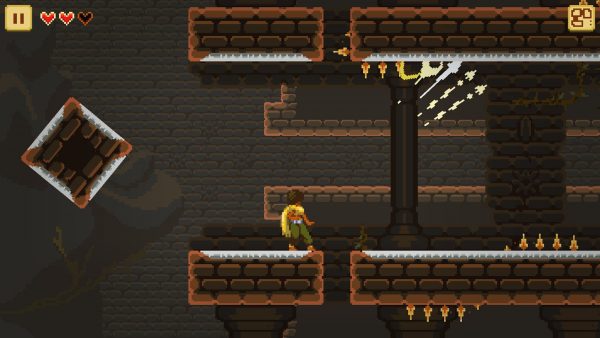Thommaz Kauffmann Interview: Dandara
Thommaz Kauffmann has recently been seeing some attention due to his recent soundtrack to Dandara. The game, developed by Long Hat House, is an unusual Metroidvania that centers on Dandara, a figure out of Brazilian history, and her quest to save the world of Salt.
In this email interview, Kauffman talks about his background and education in music, and his introduction to composing for soundtracks. Kauffman goes into detail about what composing the score entailed, including his creative process, learning of the character’s origin, finally achieving the unique sound of Dandara.
Interview Credits
Interview Subject: Thommaz Kauffmann
Interviewer: Emily McMillan
Editor: Emily McMillan
Coordination: Emily McMillan
Interview Content
Emily: Can you tell us about your background in music, and how you got into soundtrack composition?
Thommaz Kauffmann: When I was 16 my grandma sent her old piano to my parent’s house so I started to play some video game tunes by ear, improvising melodies and later on, having piano classes focused on classical repertoire (and I fell in love with Debussy’s music). At the same time, I started to search and learn how to produce music using the computer for writing/recording my own compositions.

Before that, at the age of 12, I joined some game developments forums to learn how to make my own games. So I knew some places where I could post and get feedback on my compositions and also learn from other musicians. Honestly, I can’t remember if I actually intended to join a project in the beginning but this is what happened. I was invited to compose for a shoot’em up game called Proto Thunder and after that, Oniken (a Ninja Gaiden-inspired platform by Joymasher) which happened to be the first commercial game I worked on.
Emily: What brought you on board with Dandara?
Thommaz Kauffmann: The first time I played Dandara’s prototypes was at my house when João came to São Paulo for Christmas with his family (Lucas and him are from Belo Horizonte). We had already talked about working together when I visited Belo Horizonte, but that was the first time we actually did it.
I remember I thought the whole concept of moving by swiping your fingers very cool and fluid and also the whole idea behind the story and its universe really got me. All the meaning they wanted to bring with Dandara dos Palmares for the game gave me a feeling of a very nice space for developing a musical language that could dialogue with the game.
Emily: What information, imagery, or direction did you have when you began composing? Were you familiar with the historical origins of the character, or was that something you learned about as you wrote?
Thommaz Kauffmann: I wasn’t! The first time I heard about Dandara dos Palmares was when João told me about the game!
At school, we usually study only about Zumbi dos Palmares. They managed Quilombo dos Palmares, a community where the slaves went when they fled away from the farms to survive. She was a true hero who fought against slavery but unfortunately we don’t study her story although she’s so important for the black movement here in Brazil.
So when we discussed about her meaning around the game it was clear for me that the soundtrack would have to be about hope and melancholy. We started discussing the story and what we wanted to convey with that game. It was very important at the beginning that I learned too about Salt and its functioning, organization and what each area and NPCs of the game meant to the story.

We didn’t speak anything about how the music would sound at first, they didn’t tell me how they wanted the soundtrack to be. Instead, they explained what kind of inspiration and ideas they were using for creating the game and its atmosphere. Things like life situations, art and games they liked and even music albums were brought at this first stage of discussion — and in the case of the album, it was more like what the meaning behind the music and lyrics was than actually sound reference itself.
After the discussion I started to add my own thoughts to the game, trying to translate the meanings into music. I was really into the concept of a non gravity multi-directional world and this was my first reference for searching the tone of the soundtrack. In order to do so, I thought as if the soundtrack were a sound originated from that oniric and floaty universe, by experimenting timbres and being inspired by the motivation of the characters of the game.
The idea was to create a dreamy soundtrack using synthesizers (I wanted to create some synthwave music inspired on what I was listening to at that time) but after some research and some references I decided to create a soundtrack that used more organic instruments mixed with electronic ones.
Emily: The music of Dandara is very different from your last soundtrack, Oniken, which is a much more classically retro score – whereas Dandara has influences from older games, but has a lot of more modern twists as well. What challenges did you encounter in composing for a game like Dandara?
Thommaz Kauffmann: The thing I most struggled with was to find the right instruments to be used in the whole soundtrack. I really wanted to enhance the atmosphere by adding a music where you feel a strange sonority from the instruments combinations and how they would trigger different emotions depending on the stage of the game. Also, it was very important to me to create a floaty sensation with the music so sometimes this was very challenging as well.
On the other hand, I found it was easier to bring these aspects when I thought the soundtrack as a narrative enhancement and tried to tell a story from the musical perspective. So during the compositional process, the instruments I chose were associated to a specific character or subject and then I would use them in different ways.
Emily: The tracks vary a whole lot from soft ambiance to heavy electronics, and from melody-driven to dissonant pieces. Did you have a style that you found more difficult to compose, or was it liberating to be able to take different directions on the different tracks? (or both?)
Thommaz Kauffmann: Yeah! I always struggle to compose a good melody that fits well with the flow of the game.
In the case of Dandara, I was constantly thinking of themes and its variations so it was very fun to fit those tunes on differents moods and styles.
The greatest thing of having different styles is that I could use them as narrative enhancement and give more meanings to the game with my music! So in parts where I wanted to highlight the Eldarian Army or the Intention side I used complex sounds and rhythms and more dissonants ones, while on the other hand when I wanted to tell about the Creation side I used more “flexible” instruments in order to give a more fluctuable music, more willing to morph its shape.
Emily: Which software do you use to compose? Did you incorporate live instrumentation into the Dandara soundtrack? The piano sequences especially are incredibly vibrant (I loved how they stood out in the final track, “Dandara’s Legacy”).
Thommaz Kauffmann: I use FL Studio in all my projects, for music and sound effects. I used Kontakt Libraries, Reaktor instruments and soundfonts in Dandara. Unfortunately, every instrument on the soundtrack is virtual, so nothing was recorded, not even the piano.
I had several ideas to use live instruments such as choir and strings in the whole soundtrack, but what happened was that during the process I felt that I was able to reach a different sound by manipulating the digital sounds I had in order to get a more distinct tone overall. So afterall, I was enjoying to use low quality string samples because they could evocate a different feeling than a default recording of a string section. It also gave me the opportunity to play with MIDI notes and made possible to do things that would be impossible for real instruments to play.
This is totally against the thought of composing a track that can be played by real players but in this case I felt that it would enhance even more the feeling that the song belongs to that universe. It was very fun to do these kind of things!
Emily: Did you have a favorite track or stage to score? If so, why?
Thommaz Kauffmann: It’s “Dandara’s Legacy” too! I’m glad you liked as much I do!
It’s the credits scene and what you have is a melancholic but hopeful music instead of a triumphant and happy one. I think it’s a great summary of what the soundtrack is and every time I hear this music I feel very happy for having joined the game! Also, it was the last music I did for the game and it was so easy to do! I felt so involved with the workflow already and had a such solid idea of how that music would have to sound that I could express all my feelings in that song. I’m really satisfied with this one.

Emily: Is there anything else you’d like to share about your work with your fans and fans of Dandara?
Thommaz Kauffmann: I would like thank you all for playing Dandara! I really want to people get the message behind the game or find your own interpretation. We understand it is a very special message and would be glad if we make a change towards it. Also thank you all for enjoying my music and work and to keep an eye for the next ones!
Posted on March 1, 2018 by Emily McMillan. Last modified on March 1, 2018.











I’m from Brazil and I loved this game. Best Metroid Vania ever.